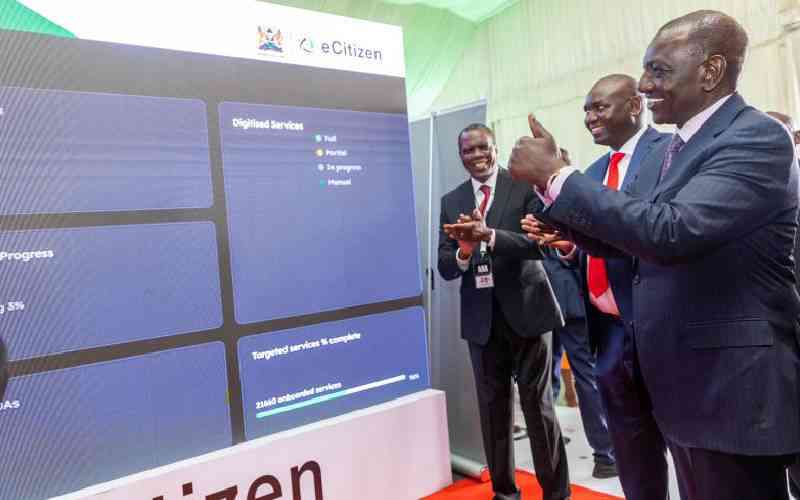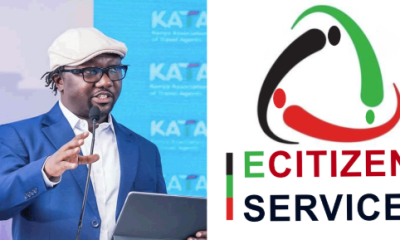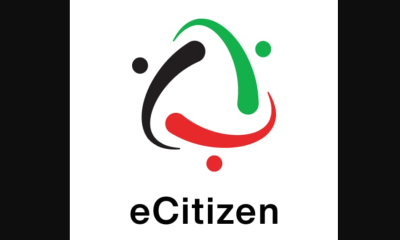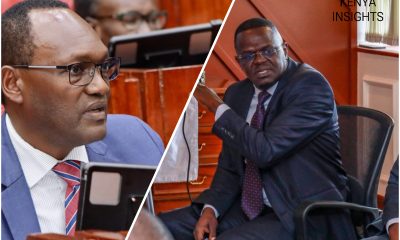Economy
Audit Reveals E-Citizen Collections Don’t Reach Treasury Accounts
Approximately 44.8 billion shillings in eCitizen collections remain completely unaccounted for

The halls of Parliament echoed with sharp questions and mounting frustration on Tuesday as lawmakers summoned Treasury Principal Secretary Chris Kiptoo to explain a financial scandal that has shaken the foundations of Kenya’s digital payment system.
The Public Accounts Committee, led by Tindi Mwale from Butere, demanded answers after discovering that billions of shillings collected through the government’s flagship eCitizen platform are not reaching Treasury accounts at the Central Bank of Kenya.
The controversy has its roots in a damning audit report by Auditor-General Nancy Gathungu, whose findings have exposed systemic failures in the country’s most widely used government payment platform.
At the heart of the scandal lies a staggering figure that has sent shockwaves through government circles: approximately 44.8 billion shillings in eCitizen collections remain completely unaccounted for, raising serious questions about financial transparency and accountability in President William Ruto’s administration.
The summoning of Kiptoo represents a culmination of years of mounting concerns that have been largely ignored by successive administrations.
As Mwale emphasized during the committee session, “The PS must come and shed more light on this matter because it’s an issue that affects government departments.”
His words carried the weight of parliamentary authority, but also reflected the exasperation of legislators who have watched recommendations gather dust while public funds continue to disappear into what appears to be a financial black hole.
The scope of the problem became clearer when MPs Joseph Namwar from Turkana, Marianne Kitany from Aldai, and Otiende Amollo from Rarieda took turns expressing their concerns.
Their questions painted a picture of a system operating with alarming opacity, where money flows in but accountability flows out. Namwar’s statement struck at the core of the issue: “It is not clear whether the money collected through the eCitizen platform ends at the exchequer accounts.”
This uncertainty about the ultimate destination of public funds represents a fundamental breakdown in financial governance.
Kitany’s observations added another layer to the unfolding scandal, highlighting that “there are cases of billions of public funds being at the eCitizen,” while noting that “its reporting mechanism is wanting.”
Her words revealed not just missing money, but missing systems of oversight that should have prevented such a crisis from developing.
Vanishing cash
The platform, designed to streamline government services and improve efficiency, appears to have instead created new avenues for funds to vanish without trace.
The urgency of the situation was perhaps best captured by Amollo, who noted that issues with the eCitizen platform have been raised consistently since 2017, yet remain unaddressed.
His frustration was palpable as he spoke of “so many queries on this eCitizen platform,” expressing the committee’s intention to issue a special letter to the National Treasury demanding explanations for years of inaction on PAC recommendations.
The parliamentary inquiry took an even more troubling turn when Solicitor-General Shadrack Mose appeared before the committee, unable to explain how revenue was being collected by the State Law Office through eCitizen.
His admission that “E-citizen does not give us a report” laid bare the extent to which government departments have been operating blind, collecting money through a system they cannot properly monitor or control.
Gathungu’s audit findings provide the most comprehensive picture yet of the eCitizen debacle.
Her examination of marriage centers alone revealed that while 116.83 million shillings was recorded from 15 centers, collections from 19 other centers went completely unrecorded due to missing periodic reports.
This pattern of incomplete record-keeping appears to be systemic rather than isolated, suggesting that the problems run far deeper than initially understood.
The Auditor-General’s report pulled no punches in its assessment of the government’s control over the eCitizen system.
Her finding that the government “lacks full system control, relying heavily on vendors for critical functions” exposes a dangerous dependency that has left public finances vulnerable.
As she warned, “Lack of full control of the system exposes the government to the risk of revenue leakages, lack of full accountability, system unavailability or downtime, security vulnerabilities and business continuity threats.”
This vendor dependency has created what appears to be an accountability vacuum.
The private companies managing critical eCitizen functions wield significant control over system configurations and growth support, including the onboarding of new government services.
This arrangement has effectively placed public financial systems in private hands, with inadequate government oversight to ensure transparency and accountability.
The scale of the problem becomes more apparent when considering that the eCitizen platform processes hundreds of millions of shillings daily from various government services.
Citizens use the platform to pay for everything from passport applications to business permits, trusting that their payments are properly channeled to government coffers.
The audit revelations suggest that this trust may have been misplaced, with significant portions of these payments failing to reach their intended destination.
The implications extend far beyond mere accounting errors.
The missing funds represent resources that should have been available for public services, infrastructure development, and social programs.
In a country grappling with budget constraints and development challenges, the loss of billions in public revenue represents not just financial mismanagement, but a betrayal of public trust.
The parliamentary investigation has also highlighted the broader governance challenges facing Kenya’s digital transformation agenda.
While the eCitizen platform was meant to modernize government service delivery and reduce corruption through digitization, it appears to have instead created new opportunities for financial irregularities.
The promise of transparency through technology has been undermined by inadequate oversight and control mechanisms.
As the controversy unfolds, questions are being raised about the selection and management of the vendors responsible for the eCitizen platform.
The extent of their control over critical government systems, combined with the apparent lack of proper oversight, has created conditions conducive to the current crisis.
The fact that key government officials, including the Solicitor-General, cannot access basic reports from the system they rely on for revenue collection illustrates the depth of the institutional failure.
The timing of these revelations is particularly significant as the Ruto administration has placed digital transformation at the center of its governance agenda.
The eCitizen platform was supposed to exemplify the benefits of embracing technology for public service delivery, but the audit findings suggest that insufficient attention was paid to establishing proper controls and accountability mechanisms alongside the technological infrastructure.
The current crisis demonstrates that technology alone cannot solve governance problems; it must be accompanied by robust institutional frameworks and accountability mechanisms.
For the millions of Kenyans who use the eCitizen platform daily, the audit revelations raise fundamental questions about the security and reliability of the system they have come to depend on.
The knowledge that billions in payments may have gone astray will likely undermine public confidence in digital government services, potentially setting back Kenya’s digital transformation agenda by years.
As Parliament prepares to scrutinize Kiptoo’s responses and demand concrete action to address the identified irregularities, the eCitizen scandal has already achieved one significant outcome: it has forced a long-overdue reckoning with the governance challenges posed by Kenya’s rush to digitize public services. The question now is whether this crisis will catalyze meaningful reforms or simply join the long list of government scandals that generate headlines but produce little lasting change.
Kenya Insights allows guest blogging, if you want to be published on Kenya’s most authoritative and accurate blog, have an expose, news TIPS, story angles, human interest stories, drop us an email on [email protected] or via Telegram
-

 Grapevine6 days ago
Grapevine6 days agoAlleged Male Lover Claims His Life Is in Danger, Leaks Screenshots and Private Videos Linking SportPesa CEO Ronald Karauri
-

 Lifestyle1 week ago
Lifestyle1 week agoThe General’s Fall: From Barracks To Bankruptcy As Illness Ravages Karangi’s Memory And Empire
-

 Grapevine2 days ago
Grapevine2 days agoRussian Man’s Secret Sex Recordings Ignite Fury as Questions Mount Over Consent and Easy Pick-Ups in Nairobi
-

 Investigations2 weeks ago
Investigations2 weeks agoEpstein Files: Sultan bin Sulayem Bragged on His Closeness to President Uhuru Then His Firm DP World Controversially Won Port Construction in Kenya, Tanzania
-

 News2 weeks ago
News2 weeks agoAUDIT EXPOSES INEQUALITY IN STAREHE SCHOOLS: PARENTS BLED DRY AS FEES HIT Sh300,000 AGAINST Sh67,244 CAP
-

 Business2 weeks ago
Business2 weeks agoKRA Can Now Tax Unexplained Bank Deposits
-

 Investigations1 week ago
Investigations1 week agoEpstein’s Girlfriend Ghislaine Maxwell Frequently Visited Kenya As Files Reveal Local Secret Links With The Underage Sex Trafficking Ring
-

 News1 week ago
News1 week agoState Agency Exposes Five Top Names Linked To Poor Building Approvals In Nairobi, Recommends Dismissal After City Hall Probe




























